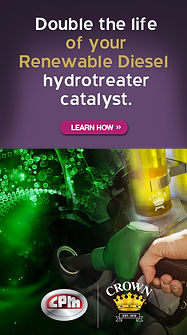- Rolls-Royce
Renewable diesel approved for use in Rolls-Royce power-generation systems

Rolls-Royce has taken a significant step towards meeting its net zero goals, set out last year, with the approval by Power Systems of its Series 4000 and Series 1600 diesel engines for use with a range of EN15940-certified synthetic diesel fuels in power-generation applications. Following successful testing, including in the field, both types of engines can use a range of sustainable fuels including biomass to liquid (BtL), hydrotreated vegetable oil (HVO) and power to liquid (PtL) fuels such as e-diesel. They can all be used to replace conventional diesel fuel.
“There is already a lot of interest in HVO in particular from many customers in the energy industry and data center business, who want to improve their carbon footprint,” explained Tobias Ostermaier, president of the Stationary Power Solutions business unit at Rolls-Royce Power Systems. “The results from pilot customers show a significant reduction in greenhouse gases, nitrogen oxide and particulate emissions by using HVO instead of fossil diesel in their gensets.”
Last year Rolls-Royce pledged to prove its most popular in-production engines, including the Series 4000, can be used with sustainable fuels by 2023.
HVO use significantly reduces CO2, nitrogen oxides and particulate emissions.
Waste vegetable oil, animal fats and used cooking oils can be used as base materials for HVO. They are converted into hydrocarbons by means of a catalytic reaction with the addition of hydrogen. Through this process, the fats and vegetable oils can supplement diesel as an admixture or replace it completely. The advantages of HVO are cleaner combustion with a reduction in particulate emissions of up to 80 percent, nitrogen oxide emissions by an average of 8 percent and—provided the manufacturing process and logistics make use of renewable energy—CO2 emissions by up to 90 percent compared to traditional diesel. Because HVO fuel is produced from renewable raw materials, its production, transport, and combustion generate only about as many greenhouse gases as were absorbed by the plants during the growth of the biomass.
The tests confirmed that mtu engines using HVO perform equally as well as engines using diesel in terms of maximum power, load acceptance and fuel consumption. HVO is a drop-in fuel, which means that there are no adaptions needed to the diesel plant infrastructure, hardware or software in order for it to be used. Synthetic fuel is also attractive to operators of emergency power systems because of its good storage stability.
As part of its sustainability program, Rolls-Royce announced last year that it would realign the Power Systems product portfolio so that by 2030, new fuels and mtu technologies can save 35 percent greenhouse gas emissions, compared to 2019 levels. The company is already successfully operating an mtu fuel cell system has established a clear roadmap for the introduction of hydrogen engines and is now progressively releasing further engines that can run on sustainable fuels in more applications.
For detailed testing results for mtu Series 4000 using HVO, please see Rolls-Royce's white paper.




















-adjusted-to-spec.jpg)



